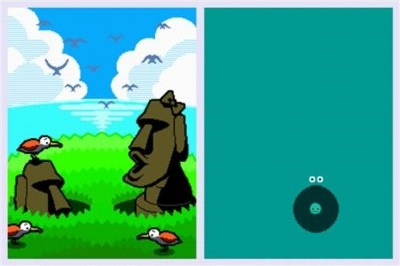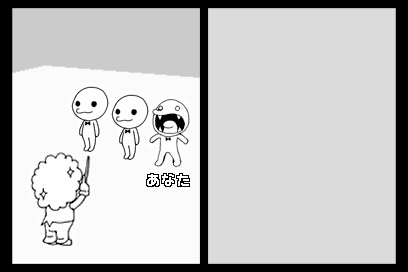Overview
Rhythm Heaven is made up of a series of rhythm-based mini-games where the player interacts with them using the touch screen. The game is played by holding the Nintendo DS sideways (book style).
Gameplay

Most of the mini-games are played in a uniquely different way, and a tutorial is offered upfront when you select to play them (the player is able to skip this tutorial anytime). The tutorial is a must for first time play through as it teaches you the basics of what gestures to perform when encountering a certain rhythm in the mini-game.
In each of the mini-games visual clues are presented on the top screen to remind the player of the pattern of the rhythm that needs to be followed. The bottom screen or the touch screen is used to navigate the main menus and to make your choice of which mini-game to play. During gameplay the touch screen is presented with very little. A pair of cartoonish eyes will appear when the the player touches the screen, while remaining blank at other times during gameplay.
 Together, now.
Together, now.On the player's first time through the game, the mini-games are presented in a sequential order. Only when the player has passed one mini-game are they then able to move on to the next. An exception to this is when the user chooses to go to the "coffee cup" section, where talking to the "cafe owner" will allow you to bypass mini-games which you have failed to pass after three attempts.
Ranking System
At the end of each play through of a mini-game the player will be presented with a ranking on how they fared. There are four different rankings:
- The fail rank. This means the player has not been able to play through the mini-game adequately enough. If it is the player's first attempt at this mini-game, then the next mini-game will not yet be unlocked.
- The pass rank. This means the player has done enough to achieve a pass in the mini-game, but is not particularly spectacular in their performance. This rank immediately unlocks the next mini-game.
- The high rank: To achieve this ranking the player will only be allowed to miss a small number of beats/moves in a mini-game. Some of the earlier and easier mini-games don't even allow you to miss a single beat to achieve this rank. The first time the player achieves this rank for a particular mini-game a medal will be awarded to the player which, when accumulated, will unlock extras in the game.
- The perfect rank: To be able to play a mini-game and attempt to score perfect in it, the player must wait until a "Perfect Campaign" appears for a specific mini-game. A "Perfect Campaign" only appears once in a while, and the selection is random from the set of mini-games which the player has already achieved a High Rating rank. To achieve the perfect rank, the player must not miss a single beat/move in the play through of the mini-game. Once the player misses a single beat they will have to try again, and the player has up to three attempts on achieving perfect for each Perfect Campaign. If the player fails to perfectly complete the mini-game in three attempts, then the Perfect Campaign is over for that mini-game and the player must wait for the next Perfect Campaign to appear (which may or may not be for the same mini-game).
Differences between the Japanese and American version
All speech and music that contains lyrics has been dubbed into English for the American release.
Japanese version
- Famous singers were used for the songs. Erina Hashiguchi from the band Canary Club provided the vocals for the Pop Singer level. The Pop Singer character's image is also based on her.
- The band THE Possible sang in the 'TV Show' level (Known as 'The Dazzles' in the USA version). They also lent their likenesses to the singers. There are 6 girls in THE Possible, just like in the level.
- The whole of the band Canary Club sang the song for the 'Cool Karate Dojo' level (Known as 'Karate Man' in the USA version).
- The credits song, 'That's Tengoku', is sung by Takeru from the band SuG.
American version
- Canary Club and THE Possible's vocal work was scrapped in favor of English language vocals which do not match the originals in intonation, pitch or emphasis. The Frog song is also sung in English instead of the original Japanese but sounds like the original vocalist. The 'Karate Man' level is also dubbed in English. 'That's Heaven', the song during the credits, is sung in English by Jojo Otani, best known for his voice work as Harris from Clock Tower 2.
Log in to comment